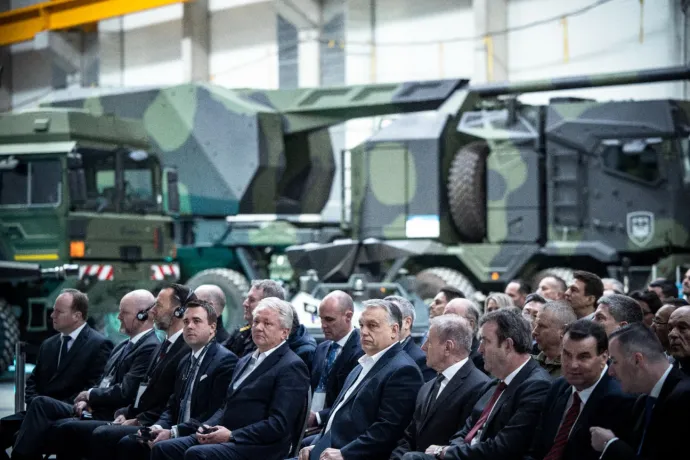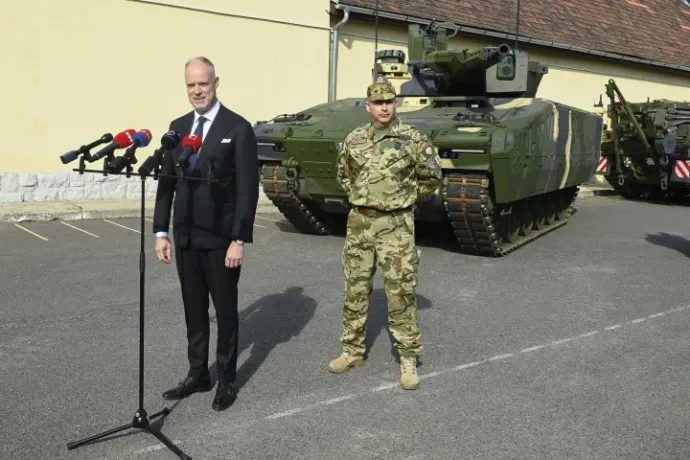Six new Hungarian arms factories to manufacture weapons for export as well – if Orbán's plan works

A few years ago, the Orbán governments embarked on a major development of the military, but they also started to develop the domestic armaments industry. Six new arms plants are currently being built in the country: more specifically, two are already operational and four are in the construction or planning phase. A German giant has been chosen by the government as a partner for the most significant investments, and the priority is to ensure that the factories being built will produce for export as well as meet domestic needs. We looked at the probability of the government's calculations on foreign orders coming true.
In recent decades, Hungary has invested little money and energy in developing its military, and the domestic defense industry has all but disappeared. With the exception of one or two major purchases (such as the Gripens), the pre-2010 governments left the defense sector to almost entirely wither away, with its armament still consisting mainly of obsolete Soviet equipment.
Until a few years ago, there was virtually no domestic arms industry, with the Siroki ammunition factory, which produces ammunition for small caliber handguns being almost the only major player left, and which is now in the hands of Luxembourg-based Beretta.
In a recent article, Direkt36 looked at the processes of Hungarian military development, for example the fact that in recent years, the Orbán governments have decided on the purchase of weapons worth thousands of billions of forints. At the same time, the Hungarian political leadership is also trying to boost the domestic defense industry.
As the development of a modern weapon takes a very long time and requires considerable know-how, the Hungarian state is not setting up the domestic defense plants on its own, but has also included a large German company in the process.
They set out to build a few arms factories in Hungary in partnership with Rheinmetall. The company was founded 130 years ago and is considered one of Europe's leading military companies. Joint ventures have been set up in which the German arms manufacturer is the majority shareholder – with 51 percent – and the Hungarian state owns the remaining 49 percent.

Rheinmetall is involved in the construction and operation of the first four of the six new Hungarian defense plants listed below:
- A plant for the production of Lynx tracked infantry fighting vehicles was built in Zalaegerszeg. Here, the test run took place in the second half of 2022, and serial production is set to begin in 2023, with an annual production of 40-50 combat vehicles planned. In Zalaegerszeg, the ZalaZone test track also has a section for testing combat vehicles.
- The production of Gidrán, a four-wheel drive armoured vehicle with mine protection capability, will begin in Kaposvár in the near future under a Turkish license. The first production hall has already been officially opened. According to Gáspár Maróth, the Hungarian 4×4 vehicles will be built to higher industrial standards and with better technology than the Turkish ones. There is talk of extending the Turkish-Hungarian cooperation in Kaposvár to the production of drones and other autonomous flying devices.
- A radar manufacturing plant is under construction in Nyírtelek. Hungarian suppliers will already be involved in the first phase of the programme, during which the locators will be assembled in Israel. In the second phase, from 2025, assembly will also take place at the new Nyírtelek factory.
- The foundation stone of a factory for the production of medium and large caliber ammunition was laid in Várpalota in December 2022. Production is scheduled to start in the second half of 2024. The complex will also include an explosives production plant.

Production has already begun in the two remaining plants, but these are not connected to Rheinmetall:
- The small arms factory of the Hungarian state-owned HM Arzenál Zrt. in Kiskunfélegyháza is manufacturing machine guns, rifles and handguns under a Czech license. Serial production of sniper rifles is also expected to start soon, and the development of a Hungarian family of guns has begun recently as well.
- A helicopter parts factory was opened in Gyula last summer: 51 percent of it is owned by Airbus, and the Hungarian state is a minority shareholder here too. Here, precision parts made of steel and titanium are produced for the airframe and the dynamic systems of the European aircraft manufacturer's helicopters, as well as some of the door panels.
A big deal between a Hungarian player and the German military company was also struck independently of the arms factories: a year ago Rheinmetall acquired a 25 percent stake in the government-owned 4iG Plc, we reported on the merger of the two companies in detail at the time. Later, the two companies founded a joint defense industry subsidiary in Cooperation with Elektronikai, Logisztikai und Vagyonkezelő Zrt, which belongs to the Ministry of Defense.
Among the Hungarian-owned military companies not producing domestically, we should also mention Aero Vodochody, a small aircraft manufacturer, which was originally a Czech company, and used to belong to now Minister of Defense Kristóf Szalay-Bobrovniczky, but was later taken over by MOL leader Zsolt Hernádi.
A few years ago, the Austrian Hirtenberger Defence mortar plant was also acquired by the Hungarian state.
The government is hoping for demand from abroad
Parts for a wide range of Airbus helicopters – both military and civil rotorcraft are manufactured at the plant in Gyula -
but for now, the other five factories are only producing equipment for the Hungarian armed forces.
Decision-makers have repeatedly said that in addition to meeting Hungarian supply needs, they would like to export armored vehicles, radars, small arms and ammunition produced in Hungary and they occasionally mention that there has been interest in domestically produced military equipment from abroad, but no concrete agreement has been reached.
Gáspár Maróth, who has long coordinated Hungarian defense development, told Portfolio two years ago that in countries which set up their defense industries purely to meet their own needs, the financing of the companies involved will become a major headache after a while. "By contrast, we are setting up joint ventures with leading players in the market because we clearly expect a return, commercial results on our investment. [...] All the public funds that we put into the development of the defense industry were invested with the intention of profit. Developing and building a factory takes two to five years, depending on its technical level, and the payback is usually between five and ten years," he said.
He also mentioned in the 2021 interview that they see a high degree of expansion in the global arms industry, in the trade of military equipment, and they expect the market to expand markedly. Since then, of course, a huge, devastating war has broken out in Hungary's neighboring country, and more and more countries are announcing that they will soon be significantly increasing their military spending, by a ratio of one and a half to twice the amount they have spent so far annually.
Hungarian export prospects may also be helped by the fact that many countries have long neglected their militaries, and therefore have relatively few assets. And in the Central and Eastern European region, there is still a lot of obsolete technology from the Soviet era, which means that there may be a demand for advanced equipment drawing on knowledge from the West.

However, the image may be somewhat tinted by the fact that, in the international market, in the context of big military procurements, the manufacturer often offers the customer the possibility of local production, or rather assembly. The high-tech elements requiring a really high level of know-how are thus manufactured in the country of the real know-how provider, but in order to give the customer a greater sense of ownership of the procurement and the equipment, the less complex phase of production is outsourced to the customer paying hundreds or even thousands of billions of forints.
Poland, for example, which is arming itself at a brutal rate, has been buying hundreds and thousands of artillery systems, tanks and other combat vehicles not only from America and Germany, but from South Korea as well, and those contracts allow a significant proportion of the equipment to be assembled in the European country. Rheinmetall is pursuing the same business policy, for example in the case of Greece, specifically with regards to the Lynxes, and has offered to have them assembled there.
Moreover, when the Slovakian government announced last year that they would be purchasing 150 infantry fighting vehicles – in other words, equipment such as the Lynx which is also produced in Hungary – the Hungarian government was quick to offer to supply them with Hungarian-made Lynxes. Rheinmetall also said that if Slovakia chose the Lynx, they would build a new assembly and repair plant there, including a test range.
Plans for a military R&D base
The architects of the Hungarian armaments industry strategy have also emphasized that research and development are an important part of the overall process. In order to better coordinate these efforts, the Defence Research and Innovation Institute will be set up, and is expected to start its operations in 2025. According to a press release, it will also have member institutes in Budapest, Szeged and Zalaegerszeg, and László Palkovics said that the planned research base should also bring back "lost" engineering knowledge to the Hungarian defense industry.
Palkovics, who left his ministerial post recently, has been appointed head of the state-owned N7 Holding National Defence Industrial Innovation Ltd (N7 Holding Nemzeti Védelmi Ipari Innovációs Zrt). When working on this article, we sent him questions on the main directions of R&D activities in the domestic defense industry, but have not yet received a reply.
For more quick, accurate, and impartial news from and about Hungary, subscribe to the Telex English newsletter!